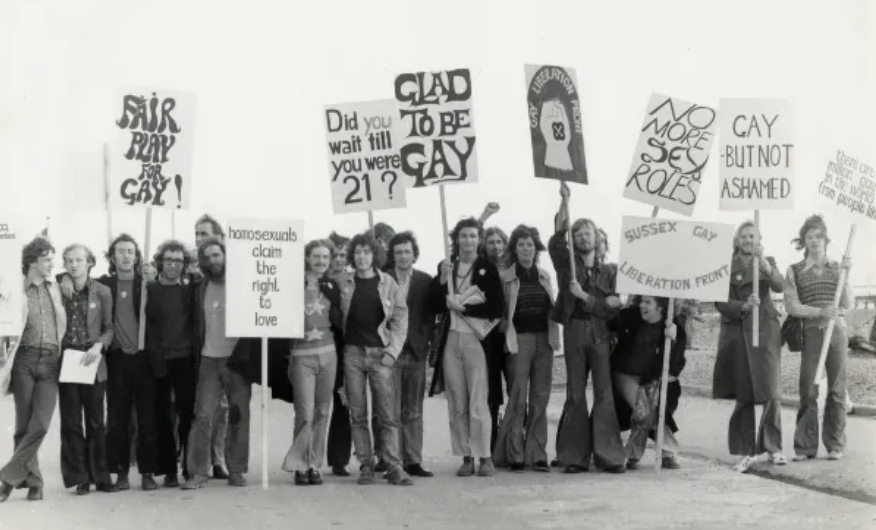Words by Madeline Mcgrath
The Universities of Sussex and Brighton, and the cities of Brighton and Hove are proud to be a safe and supportive community for LGBTQ+ people. While there is an extensive history of activism in the community, issues continue, and we need to be ready to step up our game.
Simon Watney, a University of Sussex alumni, help to establish the Sussex Gay Liberation Front (SGLF) in 1972, which included students, staff, and lesbians and gay men from Brighton.

Their first event in 1972 was aimed at laws on gay relationships, mainly that the age of consent was 21, whereas the heterosexual consent age was 16, and sex was only allowed when couples were alone in private accommodation, no hotels or dorms. These discriminatory laws were not eliminated until 1994.
In July of 1973, the first Brighton Gay Pride march took place. SFGL became GaySoc, and in 1985 lesbian activists joined to form the Lesbian-GaySoc. In the early 1990s, bisexuals were encouraged to join, and in the late 90s, trans people were also encouraged. The group not only fought for LGBTQ+ rights but also fought against fascism, racism, apartheid, and nuclearization while promoting education and women’s liberation.

The second Pride parade in Brighton happened in 1991, and though it initially had difficulty getting established, this year, Brighton will celebrate 30 years of pride. This will also be the first full year where we can celebrate marriage equality throughout the UK. (Northern Ireland legalized on Jan 13, 2020)
Reaching for Equality
There is no doubt that Brighton provides a safer space than others, but that doesn’t excuse the issues which still exist. Marriage equality doesn’t end the threats, it doesn’t stop the hate crimes, it doesn’t provide healthcare. Val Knight pointed this out during a recent campus debate.
“One thing we need in the UK is to make healthcare work for trans people by having it being informed consent-based and delivered by GPS hormones, etc., at least basic things which the UK doesn’t do and is actually falling behind on.”
Microaggressions, such as hurtful jokes, continue to “other” and exclude. Hate crimes continue to be an issue, with evidence showing that hate crimes have gone up since marriage equality in 2014.

In October, a performance by DragSoc was interrupted by unknown Zoom accounts, which joined the call to use slurs, spread hate, and terrorize. The pandemic has also limited the opportunities to thrive, which can be especially difficult for students who only have freedom on campus.
From Simon Watney, “There has been far less change in this country than most people prefer to imagine, as even a cursory glance at the front pages of the newspapers on sale in any newsagent in the land on any day of the week will alas regularly confirm.”

Pride is a protest
Sussex supports students through networking, societies, and ongoing research by academics. Resources for LGBTQ+ can be found here, specific resources for trans individuals here.
One of the struggles activists face is finding the balance between celebrating freedoms while remembering important issues continue.
“I think this is a very kind of key issue of where we go with pride, I think that celebration is hugely important and it’s so important to be visible, but if you’re visible, but not pushing forward the issues that are part of your group and part of what we are as the community struggling with, then we’re missing out on being able to be vocal and push forward the issues within politics and within a system within mainstream society,” said Tobias, an active member of the current LGBTQ+ society on campus.
Brighton Pride puts significant consideration into maintaining the balance and to work towards inclusivity. In 2019, an empty bus joined the parade to represent the homophobia in football, and they also helped provide a bus to marchers with hypersensitivity and created supportive environments during the day’s events.
For those who struggle to finance a ticket, you can volunteer to get a free ticket sign up here.

Our streets may not be paved with gay gold, but they are marched by activists, people ready to listen, and innovators looking for a bright and better tomorrow. It’s not enough to wish for a better future, action is needed. There are many ways to get involved, so don’t hesitate to find your place in the movement.





